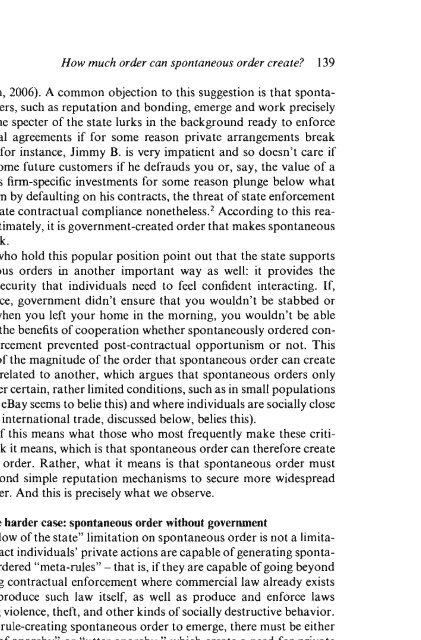Handbook on Contemporary Austrian Economics
Handbook on Contemporary Austrian Economics
Handbook on Contemporary Austrian Economics
Create successful ePaper yourself
Turn your PDF publications into a flip-book with our unique Google optimized e-Paper software.
How much order can sp<strong>on</strong>taneous order create<br />
l39<br />
Stringham, 2006). A comm<strong>on</strong> objecti<strong>on</strong> to this suggesti<strong>on</strong> is that sp<strong>on</strong>taneous<br />
orders, such as reputati<strong>on</strong> and b<strong>on</strong>ding, emerge and work precisely<br />
because the specter of the state lurks in the background ready to enforce<br />
c<strong>on</strong>tractual agreements if for some reas<strong>on</strong> private arrangements break<br />
down. If, for instance, Jimmy B. is very impatient and so doesn't care if<br />
he loses some future customers if he defrauds you or, say, the value of a<br />
producer's firm-specific investments for some reas<strong>on</strong> plunge below what<br />
he can earn by defaulting <strong>on</strong> his c<strong>on</strong>tracts, the threat of state enforcement<br />
can facilitate c<strong>on</strong>tractual compliance n<strong>on</strong>etheless. 2 According to this reas<strong>on</strong>ing,<br />
ultimately, it is government-created order that makes sp<strong>on</strong>taneous<br />
order work.<br />
Those who hold this popular positi<strong>on</strong> point out that the state supports<br />
sp<strong>on</strong>taneous orders in another important way as well: it provides the<br />
physical security that individuals need to feel c<strong>on</strong>fident interacting. If,<br />
for instance, government didn't ensure that you wouldn't be stabbed or<br />
mugged when you left your home in the morning, you wouldn't be able<br />
to realize the benefits of cooperati<strong>on</strong> whether sp<strong>on</strong>taneously ordered c<strong>on</strong>tract<br />
enforcement prevented post-c<strong>on</strong>tractual opportunism or not. This<br />
criticism of the magnitude of the order that sp<strong>on</strong>taneous order can create<br />
is closely related to another, which argues that sp<strong>on</strong>taneous orders <strong>on</strong>ly<br />
work under certain, rather limited c<strong>on</strong>diti<strong>on</strong>s, such as in small populati<strong>on</strong>s<br />
(although eBay seems to belie this) and where individuals are socially close<br />
(although internati<strong>on</strong>al trade, discussed below, belies this).<br />
N<strong>on</strong>e of this means what those who most frequently make these criticisms<br />
think it means, which is that sp<strong>on</strong>taneous order can therefore create<br />
very little order. Rather, what it means is that sp<strong>on</strong>taneous order must<br />
move bey<strong>on</strong>d simple reputati<strong>on</strong> mechanisms to secure more widespread<br />
social order. And this is precisely what we observe.<br />
10.3 The harder case: sp<strong>on</strong>taneous order without government<br />
The "shadow of the state" limitati<strong>on</strong> <strong>on</strong> sp<strong>on</strong>taneous order is not a limitati<strong>on</strong><br />
if in fact individuals' private acti<strong>on</strong>s are capable of generating sp<strong>on</strong>taneously<br />
ordered "meta-rules" - that is, if they are capable of going bey<strong>on</strong>d<br />
facilitating c<strong>on</strong>tractual enforcement where commercial law already exists<br />
and can produce such law itself, as well as produce and enforce laws<br />
regulating violence, theft, and other kinds of socially destructive behavior.<br />
For meta-rule-creating sp<strong>on</strong>taneous order to emerge, there must be either<br />
"pockets of anarchy" or "utter anarchy," which create a need for private<br />
meta-rules in the first place. For both types of anarchy, sp<strong>on</strong>taneous metarules<br />
emerge not because government instituti<strong>on</strong>s exist but are impractical<br />
or costly to use. They emerge because for some or all kinds of interacti<strong>on</strong>,<br />
government instituti<strong>on</strong>s do not exist.

















